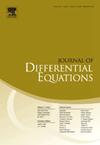非局部系数扩散的Lotka-Voterra竞争模型
IF 2.3
2区 数学
Q1 MATHEMATICS
引用次数: 0
摘要
考虑具有非局部扩散的经典Lotka-Volterra竞争系统,扩散系数以非线性方式依赖于总体。这种扩散模型表明,物种倾向于离开拥挤区域或被吸引到种群密度较高的区域,这分别取决于非线性函数的增加或减少。在扩散系数中包含这些非局部项会带来重大的技术困难。我们根据模型的系数给出了模型共存状态存在和不存在的结果。本文章由计算机程序翻译,如有差异,请以英文原文为准。
Lotka-Voterra competition model with nonlocal coefficient diffusion
We consider the classical Lotka-Volterra competition system with non-local diffusion, specifically, the diffusion coefficients depend on the total population in a nonlinear way. This kind of diffusion models that the species tends to leave crowded areas or is attracted to regions with higher population density, depending on whether the nonlinear function increases or decreases, respectively. The inclusion of these non-local terms in the diffusion coefficients entails significant technical difficulties. We show results of the existence and non-existence of coexistence states of the models depending on the coefficients of the model.
求助全文
通过发布文献求助,成功后即可免费获取论文全文。
去求助
来源期刊
CiteScore
4.40
自引率
8.30%
发文量
543
审稿时长
9 months
期刊介绍:
The Journal of Differential Equations is concerned with the theory and the application of differential equations. The articles published are addressed not only to mathematicians but also to those engineers, physicists, and other scientists for whom differential equations are valuable research tools.
Research Areas Include:
• Mathematical control theory
• Ordinary differential equations
• Partial differential equations
• Stochastic differential equations
• Topological dynamics
• Related topics

 求助内容:
求助内容: 应助结果提醒方式:
应助结果提醒方式:


